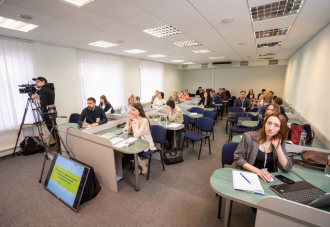On the path of integration into the European Union, Ukraine undertook to implement standards in the field of prevention and combating money laundering and terrorist financing, in particular standards of the Financial Action Task Force (FATF) on Money Laundering and Terrorist Financing and standards equivalent to those adopted in the European Union. Such obligations are enshrined in the Association Agreement between Ukraine and the EU, the European Atomic Energy Community and their member states.
Therefore, in 2020 new legislation in the sphere of combating money laundering, financing of terrorism and proliferation of weapons of mass destruction came into effect in our country.
The civil sector started to feel the effect of this legislation about two years ago, with the “canary in the coal mine” – the requirements to submit information on ultimate beneficial owners (UBO). Later, after the full-scale invasion began, banking problems became more frequent, with CSOs having their bank accounts suspended or denied service and account opening due to financial monitoring measures.
Starting in 2021, experts from CEDEM, ISAR Ednannia and UCIPR under the Ukraine Civil Society Sectoral Support Activity started working on identifying financial monitoring risks for civil society organizations (CSOs) and looking for ways to overcome them. In particular, in 2021, the first public discussions in the sector on the peculiarities of the UBO definition took place. We have also worked to consolidate the sector’s position on the UBO definition, bringing together more than 300 organizations.
A year ago, our team focused on addressing CSOs’ banking problems and launched a campaign to improve the AML/CFT legal environment so that it does not hinder CSOs’ legitimate activities and public and primary financial monitoring actors do not see the public sector as a threat to be “crushed” by over-regulation, but as a reliable ally that can help.
A good means to achieve these goals is to learn from foreign experience. And in April 2023, thanks to our cooperation with the Federal Ministry of the Interior of Germany, as well as with the German non-profit organization VENRO, CEDEM, ISAR Ednannia and UCIPR managed to make a study visit to Germany. The visit was made by the representatives of the civic and public sector, in particular the Ministry of Foreign Affairs of Ukraine, the Ministry of Finance of Ukraine, the State Financial Monitoring Service, the Office of the Prosecutor General, the State Tax Service, Security Service of Ukraine, and the National Bank of Ukraine.
On the German side, representatives of authorities involved in national risk assessment (NRA) joined the delegation: The Federal Ministry of Finance, the German Federal Ministry of the Interior, experts from the Federal Ministry of Justice, and representatives of the German Financial Intelligence Unit.
The realities of the sphere of anti-money laundering and terrorist financing in Germany for non-profit organizations differ significantly from those in Ukraine. The focus is on terrorist financing in two aspects – when organizations are established and operate with the purpose of such financing or when they are involved in such activities without realizing it. Although money laundering is a serious problem in Germany, the state does not assess non-profit organizations (NPOs), which include CSOs, in the context of this risk, because various factors make it impractical to use NPOs for money laundering. According to German colleagues, it is much easier to do this through real estate (the law prohibiting the purchase of real estate for cash did not come into force until early 2023). In Ukraine, the state pays much more attention to the risk of money laundering through NPOs.
What does the “state” mean in both cases? Both Ukraine and Germany are required to conduct regular National Risk Assessments to determine their money laundering and terrorist financing risks, as both countries must adhere to international AML/CFT standards and FATF requirements.
Note: FATF was founded in 1989 at the G7 Summit in Paris to combat the growing problem of money laundering. FATF’s mandate was expanded to combat terrorist financing after the September 11, 2001 attacks. One of FATF’s activities is to identify so-called non-cooperative countries and territories and compile a list of them, which is referred to as a “blacklist”. Although the de jure blacklisting of a country does not directly lead to the imposition of sanctions (the Group has no jurisdiction to do so), it de facto puts such a country under significant financial pressure as it forces financial institutions to withdraw resources and services from these countries. At the moment Ukraine is advocating for the Russian Federation to be put on this blacklist.
So, in Ukraine, the National Risk Assessment (NRA) is the responsibility of the State Financial Monitoring Service, which should conduct such an assessment every 3 years. The latest (third) round took place in 2022, but the publication of the report on this assessment was delayed due to the war. In Germany, the National Risk Assessment is conducted by the Federal Ministry of Finance every 4 years. The assessment of the non-profit organization (NPO) sector is a component of the NRA, but it is the responsibility of the Federal Ministry of the Interior, which is charged with preventing terrorist financing in the non-profit sector.
Here too, the German Ministry of the Interior was acting very wisely, as no one knew the sector better than its representatives, so the Ministry was actively cooperating with NPOs. The 2020 Sectoral Assessment was created with the direct involvement of the sector and incorporating the findings of an independent sector assessment by the German umbrella NPO VENRO.
Both sectors recognize that cooperation between them is important, because without the help of the non-profit sector, the state would have a weak understanding of the specifics of the activities of non-profit organizations and would not be able to properly assess the riskiness of the sector and develop an appropriate action plan. The non-profit sector is not a threat, but an ally, cooperation with which brings a number of benefits to the state sector, in particular:
- Obtaining up-to-date and immediate information about the state of threats and problems in the sector, because the non-profit sector knows better what its concerns are.
- Being able to develop preventive measures to prevent the terrorist threat in the sector.
- Implementing important urgent humanitarian and charitable tasks in crisis situations and in crisis territories, when actions by the forces of state authorities alone are ineffective and slow.
Instead, the state sector helps in solving the problems of the sector, in particular with derisking.
Derisking is when a financial institution is severing or limiting the business relationship with a particular client or category of clients in order to avoid risks rather than manage them using the FATF risk-based approach. Cases of derisking in relation to charities and NGOs in Ukraine are not uncommon, so the civic sector pays special attention to it.
In Germany the problem of derisking is dealt with by the Federal Ministry of Finance which conducts a survey among banks and creates a dialogue platform in the format of round tables with the participation of state, private and public sectors to find ways to solve this problem. Such a dialogue could be effective for Ukraine as well.
The main partner of the state in the sectoral evaluation of NPOs in Germany is the umbrella NPO VENRO, which brings together more than 140 different non-profit organizations in Germany. The organization advocates the interests of the non-profit sector in Germany, 14 working groups of the organization’s representatives work on an ongoing basis to improve the position of NGOs and charitable organizations, and to solve the global problems they face.
Germany also has the practice of “Seal of Approval” in place, which consists in granting a kind of integrity status to non-profit organizations. This status is granted by The German Central Institute for Social Issues/DZI, which consists of representatives of the state, private and public sectors.
As for the prosecution of NPOs for terrorism financing, the procedure in Ukraine and Germany differs significantly.
The decision to ban the activities of an organization involved in the financing of terrorism in Germany is made by the Federal Ministry of the Interior, and the property and funds of such an organization are confiscated for the benefit of charity (a good idea for Ukraine).
In case of disagreement with the decision, the NPO may appeal it in court. The procedure is regarded as administrative penalty and is not related to criminal prosecution of persons involved in the NPO, which is the responsibility of the Federal Prosecutor’s Office.
The prohibition procedure can also be applied to organizations that are not officially registered, but attributes inherent to an organization (management structure, budget, etc.). Such a procedure is impossible in Ukraine.
The decision to ban the activities of NPOs is made only by the court. If we are talking about banning a public association, then it is made at the suit of the Ministry of Justice of Ukraine.
The procedure can be initiated in particular if the authorized persons of the organization are convicted of committing a criminal offense against the foundations of national security of Ukraine, provided for by Article 111-1 of the Criminal Code of Ukraine.
Funds and property of the organization in the event of a ban are levied to the state budget.
The procedure is not applied to organizations that are not officially registered. Members of such an informal organization are held accountable individually.
Ukraine is rapidly and confidently moving towards integration into the European environment. However, on this way we will all have a lot of work to do in order to meet the EU standards. The sphere of financial monitoring and combating terrorism financing is complicated, and not only for Ukraine. Even such successful European countries as Germany are still learning a lot and constantly improving, choosing the path of cooperation with the private and public sector. Ukraine should also use these practices, because unlike Germany, we are still at war with a terrorist state, which we can overcome only together.
Important materials:
- German National Risk Assessment Report 2018/2019(English);
- Strategyto Counter Money Laundering and Terrorist Financing based on the results of the 2018-2019 German NRA Report (English)
- German Report Sectoral Risk Assessment 2020 – Non-Profit Sector (English);
- Report on the Independent Internal Assessment of the Non-Profit Sector in Germanyof NGO VENRO (in English);
- National Risk Assessment Report in Ukraine (2016);
- Report on the Regular (Second) National Risk Assessment in Ukraine (2019);
The presentation of the results of the regular (third) National Risk Assessment in Ukraine took place within the International Conference “AML/CFT/FPWMD Supranational and National Systems: Challenges and Prospects”. Publication of the Report on the regular (third) National Risk Assessment in Ukraine has been postponed according to the Decision of the Council on the Prevention and Counteraction to Legalization (Laundering) of Proceeds from Crime, Financing of Terrorism and Financing of the Proliferation of Weapons of Mass Destruction of December 29, 2022, Minutes No. 14.



